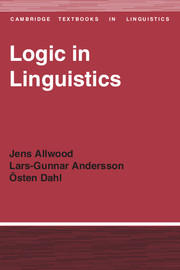Book contents
- Frontmatter
- Contents
- Preface
- Symbols and notational conventions
- 1 Logic for linguists
- 2 Set theory
- 3 Inference and logical analysis of sentences
- 4 Propositional logic
- 5 Predicate logic
- 6 Deduction
- 7 Modal logic
- 8 Intensional logic and categorial grammar
- 9 Further extensions
- 10 Logic for linguists?
- References
- Answers to exercises
- Index
7 - Modal logic
Published online by Cambridge University Press: 05 June 2012
- Frontmatter
- Contents
- Preface
- Symbols and notational conventions
- 1 Logic for linguists
- 2 Set theory
- 3 Inference and logical analysis of sentences
- 4 Propositional logic
- 5 Predicate logic
- 6 Deduction
- 7 Modal logic
- 8 Intensional logic and categorial grammar
- 9 Further extensions
- 10 Logic for linguists?
- References
- Answers to exercises
- Index
Summary
Modal operators
Propositional and predicate logics, as formulated in the preceding chapters, are restricted to talking of only one possible world at a time. When interpreting certain sentences in natural language, however, we seem to want to talk about relations between different possible worlds. We saw one example of this on p. 22. Another example is:
(1) It is possible that it will rain tomorrow
A person who utters this sentence does not normally know for sure what the weather will be like tomorrow: he can imagine several possibilities. In other words, the world as it will look tomorrow is for him one of several possible worlds. What he says when uttering (1) is that there is at least one of these possible worlds where it will rain tomorrow.
The following sentence can be interpreted in a similar way.
(2) It is certain that it will rain tomorrow (or perhaps, more idiomatically: It will certainly rain tomorrow)
(2) means that whichever of the possible worlds comes to be realized, it will rain tomorrow. In other words, it will rain tomorrow in all possible worlds.
We can thus define ‘possible’ and ‘certain’ in the following ways.
possible = true in some possible world
certain = true in all possible worlds
The possible worlds we talked about in these examples were more or less the worlds which are compatible with what we know.
- Type
- Chapter
- Information
- Logic in Linguistics , pp. 108 - 124Publisher: Cambridge University PressPrint publication year: 1977

